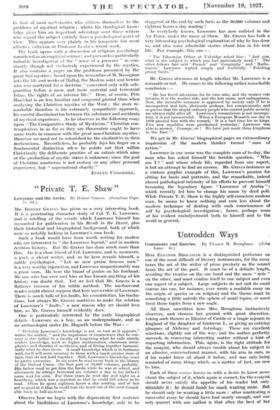"Private T. E. Shaw"
Lawrence and the Arabs. By Robert Graves. (Jonathan Cape.
. 7s. Gd.)
, ROBERT GRAVES has given us a very interesting book. It is a penetrating character study of Col. T. E. Lawrence, and :a retelling of the events which Lawrence himself has recounted for publication in his Revolt in the Desert, plus their historical and biographical backgrround, both of which were so notably lacking in Lawrence's own book.
Surh a book would have been worth writing for readers who are interested in ." the Lawrence legend," and in modern Arabian history. But Mr. Graves has done much more than this, lie is a close friend of Col. Lawrence, and is, moreover, a poet, a clever writer, and, as he here reveals himself, a subtle psychologist. " Let us now praise famous men" is a very worthy injunction, and Lawrence unquestionably was a great man. He bore the brand of genius on his forehead. No one who has ever met him or has known anything of his history can doubt that. Yet we feel that Mr. Graves is a flatterer because of his subtle -method. The unobservant reader might almost suppose that here was a critic of Lawrence. There is much talk of his faults, his eccentricities, his limita- tions, but always Mr. Graves contrives to make the relation of Lawrence's " faults," a new reason why we should love him, as Mr. Graves himself evidently does.
One is particularly interested by the early biographical details—Lawrence as a boy, as an undergraduate, and as an archaeologist under Dr. Hogarth before the War
Probably Lawrence's knowledge is not so vast as it appears," writes the author, " and the impression of omniscience that he con- voys is due rather to a faculty of forgetting what he calls utterly useleAs knowledge, such as higher mathematics, classroom meta- physics and theories of aesthetics, and of fitting together harmoni- misly what ho does know: A small knowledge which is in harmony with:itself will seem uncanny to those with a much greater store of facts that do not hold together. Still, Lawrence's knowledge must be.pietty extensive. In six years he read every book in the library of the Oxford Union—the best part of 50,000 volumes, probably. His father used to get him the books while he was at school, and afterwards he always borrowed six volumes a day in his father's name. and his own. For three years he read day and night on a hearthrug, which was a mattress so that he could fall asleep as he read.. Often he spent eighteen hours a day reading, and at last got so good at it that he could tear tho heart out of the most formid- able book in half-an-hour."
Observe how we begin with the deprecatory lint sentence about the limitations of Lawrence's knowledge, only to be staggered at the end by such facts as the 50,000 volumes and eighteen hours a day reading !
As everybody knows, Lawrence has now enlisted in the Air Force, under the name of Shaw. Mr. Graves has both a very interesting psychological explanation of why he has done so, and also some admirable stories about him in Isis new life. For example, this one :—
" The Education Officer at Uxbridge asked him : And you, what is the subject in which you feel particularly weak ?' The other fellows had said ' French' and Geography' and Mathe- matics.' Lawrence replied simply and truthfully, Polishing greasy boots.' "
Mr. Graves discusses at length whether Mr. Lawrence is a romantic or not. He comes to the following rather remarkable conclusion :--
" He has loved adventure for its own sake, and the weaker side because it is the weaker side, and the lost cause, and unhappiness. Now, the incurable romantic is approved by society only if he is incompetent and fails, gloriously perhaps, but conspicuously, and so proves that the stupid ordinary people who control public security are always right after ail. Lawrence's romanticism is not incompe- tent, it is not unsuccessful. When a European Monarch one day in 1919 greeted him with the remark, ' It is a bad time for us kinga. Five now republics were proclaimed yesterday,' Lawrence was able to answer, Courage, sir ! We have just made three kingdoms in the East.' "
We get in Mr. Graves' biographical pages an extraordinary impression of the modern thinker turned " man of action."
Lawrence in one sense was the complete man of to-day, the man who has asked himself the terrible question, " Who am I ? " and whose whole life, regarded from one aspect, is but an attempt to find an answer. Mr. Graves instances as a curious graphic example of this, Lawrence's passion for sitting for busts and portraits, and the remarkable, indeed almost pathological intensity of his efforts to prevent himself becoming the legendary figure " Lawrence of Arabia ";I which recently led him to change his name by deed poll. While Private T. E. Shaw is the highly self-conscious modern man, he seems to know nothing and care less about the modern technique of dealing with such consciousness of self . by psychological investigation ; hence, perhaps some of his evident maladjustment both to himself and to the world in general.














































 Previous page
Previous page